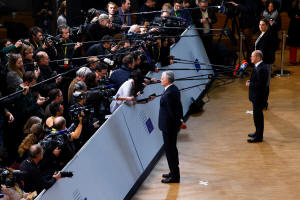|
The two countries rejected the package saying it would offer
Russian oligarchs loopholes to evade EU sanctions, Lithuanian
Foreign Minister Gabrielius Landsbergis told reporters in
Vilnius.
Fresh sanctions on Moscow have been held up by disagreement over
whether the EU should make it easier for Russian fertilizer
exports to pass through European ports, even when the producers
are owned by blacklisted oligarchs.
Some say EU restrictions pose a food security threat to
developing countries, while others argue that relaxing them
would allow Russian oligarchs who own fertilizer businesses to
dodge EU sanctions against them.
As EU leaders gathered for the last summit of the year in
Brussels, an EU diplomat said countries had moved closer to a
deal and that a new sanctions draft was expected to be
circulated on Thursday evening.
In Vilnius, Lithuanian Prime Minister Ingrida Simonyte warned
against softening the sanctions.
"Agriculture is not sanctioned (by the EU), but some fertilizer
oligarchs or companies are," she said.
"There are problems with some cargoes stuck due to fear of
sanctions, but this should be solved with guidelines and not by
putting exceptions into the regulation which, to us, seem very
wide and can be very widely interpreted," she added.
Others countries argue the existing sanctions regime hampers
fertilizer exports amid a global food crunch and demand clarity
instead of case-by-case decisions over specific cargoes.
"The legal situation as it is actually prevents transiting
fertilizer... through Rotterdam to third countries, even if it's
for the World Food Program," a senior EU diplomat said.
"Let's not listen to those who try to present this as if we were
practically de-listing Russian oligarchs, because that's not the
case.... We're talking about the risk of famine."
(Reporting by Sabine Siebold and John Chalmers in Brussels and
Andrius Sytas in VilniusEditing by Tomasz Janowski)
[© 2022 Thomson Reuters. All
rights reserved.]
This material may not be
published, broadcast, rewritten or redistributed.
Thompson Reuters is solely responsible for this content.

|
|




